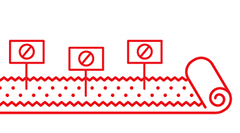In the mid-1990s, an organization called the National Smokers’ Alliance sprung up in the U.S. to fight new laws to restrict smoking. Although the group seemed to have been started by disgruntled smokers, it had, in fact, been created by Philip Morris Tobacco.
By masking its role in what seemed to be a grassroots movement, the company was “astroturfing.” Used by corporations to influence public policy, the practice is now being employed to get people to buy products, says Jenna Jacobson, a PhD candidate at the Faculty of Information. Companies identify social media “influencers” and pay them to promote their brands to followers. Not all influencers disclose the relationship, though – hence: astroturfing. “One objection is that audiences are being duped,” she says.
Recent Posts
People Worry That AI Will Replace Workers. But It Could Make Some More Productive
These scholars say artificial intelligence could help reduce income inequality
A Sentinel for Global Health
AI is promising a better – and faster – way to monitor the world for emerging medical threats
The Age of Deception
AI is generating a disinformation arms race. The window to stop it may be closing




